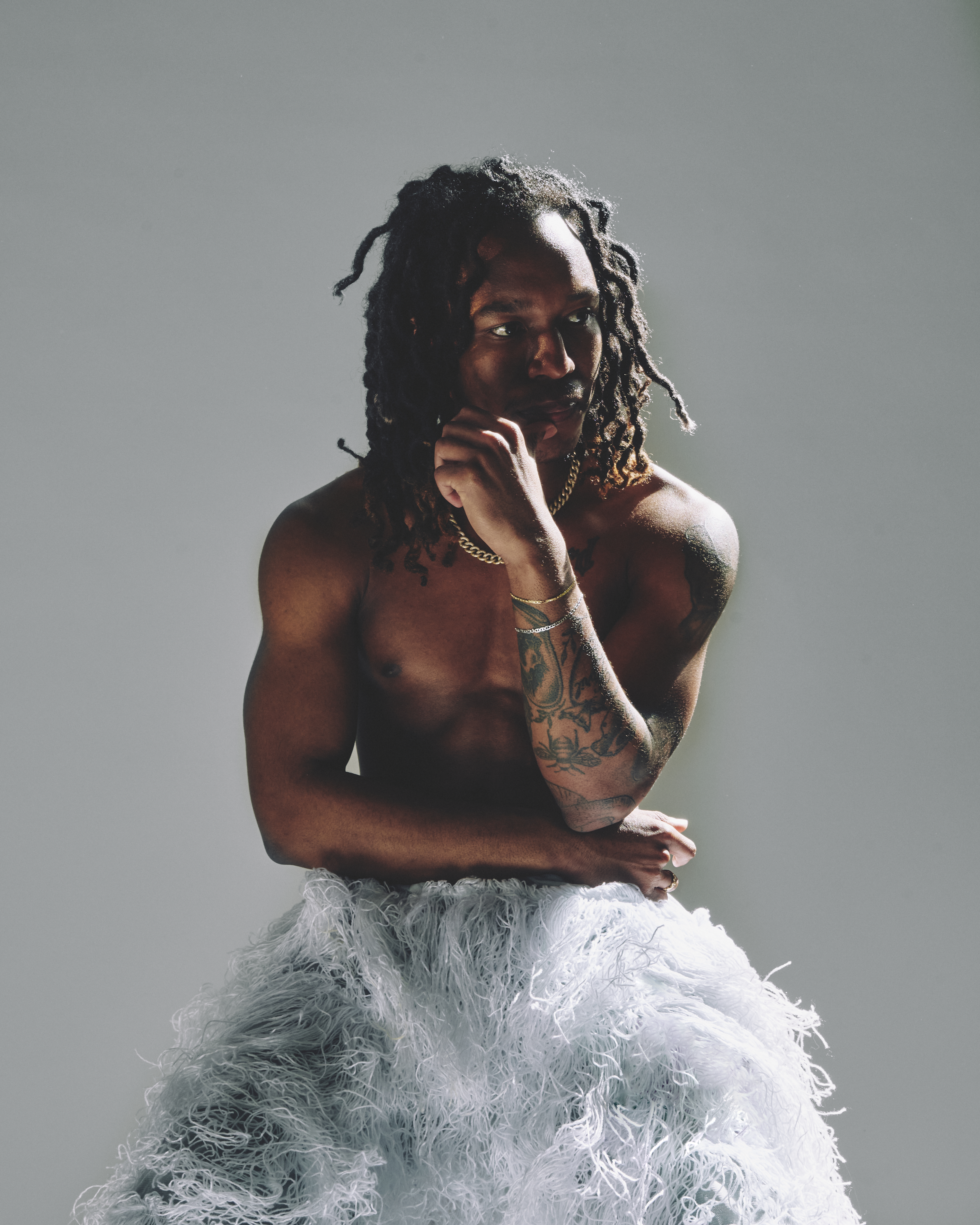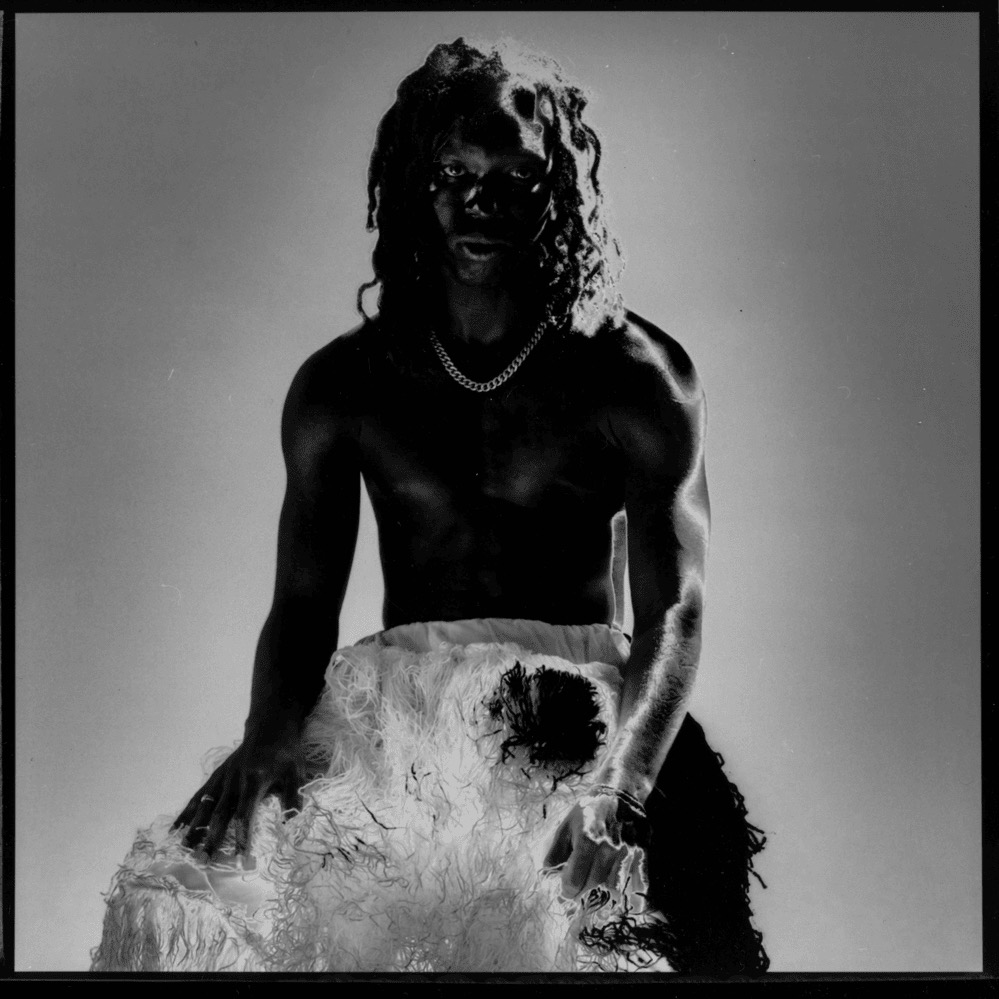An Ever-Changing Artist: MAVI’s Ephemeral ‘Shadowbox’

When MAVI, the acutely pensive rapper and artist from Charlotte, pops up on my computer screen, I immediately notice the painting. It’s a print of Portrait of Madeleine (1800) by Marie-Guillemine Benoist, framed and hanging above his bed. The original, housed in The Louvre, is one of the most revolutionary images from the Salon, noted for the titular black female subject. Since its creation, Madeleine has been a piece ever-evolving, undergoing intense inquisition regarding identity, symbolism, and cultural impact; in 2019, the piece adopted its current title after centuries under the moniker, “Portrait d’une femme noire” (Portrait of a Black Female). Within the modern zeitgeist, the portrait has been extrapolated in seemingly every context, from the cover of Marlon James’ The Book of Night Women to the opening ceremony of the 2024 Paris Olympics. Yet, the piece’s poignance in MAVI’s house seemingly symbolizes his interconnected philosophy on creation, interpretation, adaptation, and how we interact with art. Through his opinions on the artistic landscape and a personal voyage into the world of visual art, MAVI’s latest record, Shadowbox, found its footing.
As he geared up for the inevitability of creating a record, the museum became a sanctuary of sorts, noting a relatively recent “understanding” of art. While navigating these new expanses, MAVI also understood the exact type of perspective he didn’t love. “It was a frustrating process because I would read placards and they would be really prescriptive, like this guy used green and blue to say this. And I’m like ‘How the fuck do you know that,’ and so I developed through my burgeoning love for visual art and my frustration with the current state of art criticism, a way of loving art because I understand the artist, not because I know them. Because I feel them, not because I know exactly what they’re trying to do.”
Due to his distaste for the dogmatic, intellectualization occurring in such institutions—noting how “Rap Genius-ed out” museum placards are—the musical process for Shadowbox became a practice of description, rather than prescription. “That led me to choose the soundscapes and the instrumentals…I couldn’t say I want beats to have this and this and this, I just want music that will help me do this the right way.” Still, MAVI emphasized the importance of control. In a 2023 NPR interview, he discussed the concept of “choice” as it pertained to his sophomore record Laughing So Hard, It Hurts, claiming much of that album was not of his choosing. On Shadowbox, he attempted to gain some of that control back.
“Because I felt like I had less choice in the making of Laughing So Hard, It Hurts, I was kind of an asshole making this one. I’ve directed every video and I’ve had a hand in designing or writing every facet, from my press release to my liner notes, even my photos, the album cover…it’s definitely about me taking responsibility and control in terms of the philosophy behind my role in the creation. But a lot of the subject matter is not of my choosing. I knew I had to make an album and I also knew [it was like], if I don’t want to rap today, I’m not going to fucking rap…What my life was like while that process was happening: I’m getting drunk and dragging myself out of bed in the throes of a hangover, or I’m heartbroken, or somebody just died, or me and the homies just did some crazy shit. And that’s kind of the point of the title…I started to worship the moment. If God is the best artist, then the moment is the highest form of creation.”
The album’s title is particularly striking in its double meaning, following the pattern of dichotomous titles like that of the melancholic Laughing So Hard, It Hurts. The conception of “the moment” within the album’s creation, particularly the sensation of spontaneity, encompasses both the good and bad. It becomes both an ode to the pure, irreplicable genesis of submitting to “the moment”, as well as the addictive and unraveling consequences of constantly seeking such feelings and the subsequent fight with oneself.
“A lot of the ways this album functions is me putting my failures in this trophy case as a plea for humanity. And also, it’s about my philosophy and how I made the songs, the videos, the products, even how I did the mastering. The entire product side of this album was based around tactility and memory,” he says. In creating the album, he emphasized the ephemeral nature of studio sessions and stimuli of analog technologies. “Every song on the album was written in the studio, it was mastered on tape…None of the songs had multiple recording sessions for them. The day that it came to me was the day it was recorded. This album happened so in that sense it was out of my control, but in terms of the direction and the thinking, the design, the structure, the lyrics, I had a lot more control.”

On the other side of chasing “the moment” is MAVI’s life during Shadowbox’s conception, sharing, “Honestly, I have had too much alcohol and too much women throughout the creation of this album.” The lead single, “Drunk Prayer,” exposes this candidness in the chorus, repeating the refrain, “I drink ‘til I can’t feel shit.” He expands on the song’s religious tones by referencing the interlude, “Drown The Snake,” a conversation where his friend and fellow Charlotte-based rapper, EASTSIDE BROTHA describes the coexistence of a demon alongside one’s inner child.
“He’s from a lineage of preachers and is devoutly into church…I was raised very differently; my dad is under the Nation of Gods and Earths, kind of [part of the] Five Percenters tradition, but in general, leans towards non-tradition. His parents and grandparents were super religious and the nihilism that comes from having a super religious family, but also poverty, hurt him in a very irreparable way, in that we were raised almost against the religion of spirituality and more towards science and empiricism. I always envied religious people because I’m somebody who always struggled with overindulgence—drugs, alcohol, women, violence, money…I have a real soft spot for the pious because I can never achieve that because I never submitted to something big enough to feel strong consequences for not submitting to it…He told me an anecdote that showed that his choosing that path of religiosity wasn’t because he was ignorant of how cruel the world could be, it was in spite of his knowledge of how cruel the world could be.”
MAVI’s envy of, and a general intrigue with religion appear in both “Drunk Prayer” and “I’m So Tired,” the album’s second single. On the latter, he expands this sense of spirituality outwards, as he did with High John de Conqueror on Laughing So Hard. This time, he focuses on Greek mythology, rapping, “The only certainty lurin’ me into Hades lately / Persephone flirt with me, I was seven first heard her sing / Since then, Heaven a blur to me, every step exes hurting me.” It is this poetic candor that makes MAVI’s rapping so distinct: an ability to encapsulate frank experiences within multiple layers of nebulous interpretation.
Along with religious discussions, MAVI notes The Black Experience in Design as a pivotal influence on himself and the record. The text, which features essays by some of the most renowned Black artists and thinkers of the 20th- and 21st-centuries—from Emory Douglas to Ruha Benjamin—emphasizes a sense of lineage and interdisciplinary practice. Graphic designer Sylvia Harris claims, “Black design traditions must be pieced together from a variety of sources to make a complete canon of Black expression,” an ethos that MAVI wholeheartedly embodies.
While rapping has catapulted him into success, it is his curiosity and commitment to growth that has allowed him to maintain such a status. He talks about his future vibrantly, relaying near ventures and distant goals with a sense of giddiness. “I have an urge to seek new ways to understand myself and my life and what I like and what I don’t like.” He talks about fashion “guiding lights” like Grace Wales Bonner, Martine Rose, and Issey Miyake, as well as visual art influences like Kerry James Marshall and Charles White. He chuckles as he talks about the house he’s buying “to get all freaky”, mentioning Mexican modernist architect Luis Barragán’s synthesis of color and shape as inspiration.
Beyond art, MAVI’s innate curiosity was also the driving force behind his academic pursuits, famously attending Howard University for biology and neuroscience during the release of his 2019 debut record Let the Sun Talk. Performing open mics and honing his craft, he proclaims, “There’s probably nothing harder than trying to make something that’s cool to other fucking 20-year-olds.” Luckily, his music resonated and at college, he was able to thrive off the energy of those who share this same excitement for their niche. “When people get nerdy, that does something for me. Just the bravery, especially my professors at the beginning of my college career, to get hella nerdy and giggly. Like you’re a fucking 65-year-old man bursting with laughter teaching Biology 101…This is how I need to feel about stuff.”
He is passionate about finding threads in any discipline. “I don’t think there’s any class that you could take in college that would be irrelevant to an artist. Take everything as a contribution to your artistic consciousness.” Even in a subject like math, MAVI recognizes its impact. “Math is very round and on songs that I have a hook, I always like the last line of the verse to lead neatly—rhyme scheme-wise and thematically—back into the hook. I like making smooth continuums where any verse or hook of the song could be the variable and given the other two things you could solve for the other variable.”
While MAVI continues his ascent in rap, it’s exciting to see how expansive his vision is for himself, collecting new disciplines to infuse into his craft. Though music is very much his current focus, he already has ideas for what is further down the road. “My dream job is not to be a rapper…My dream job is to teach biology at my old high school, I just want to be rich where it doesn’t matter and I have the luxury to do that but that’s what I really want to do. Pedagogy, the art of teaching, the art of connecting with the youth is a part of life that I have not had the luxury of studying but I really, really want to because I have some ideas about it and about different ways we can leverage authority and visual propaganda to inspire children to be enthusiastic about learning.”
Though the classroom is on the distant horizon, MAVI’s philosophies are very much here now. On Shadowbox, with a flexed pen and an expanded outlook, he proves he has many lessons to offer.

MAVI will head on tour this fall with support from Malaya and Messiah!, featuring Pink Siifu, Ovrkast, Chenayder, Vayda, Sideshow, Niontay, Igwe Aka, and Ahmir. His new album, ‘shadowbox,’ is out now.




